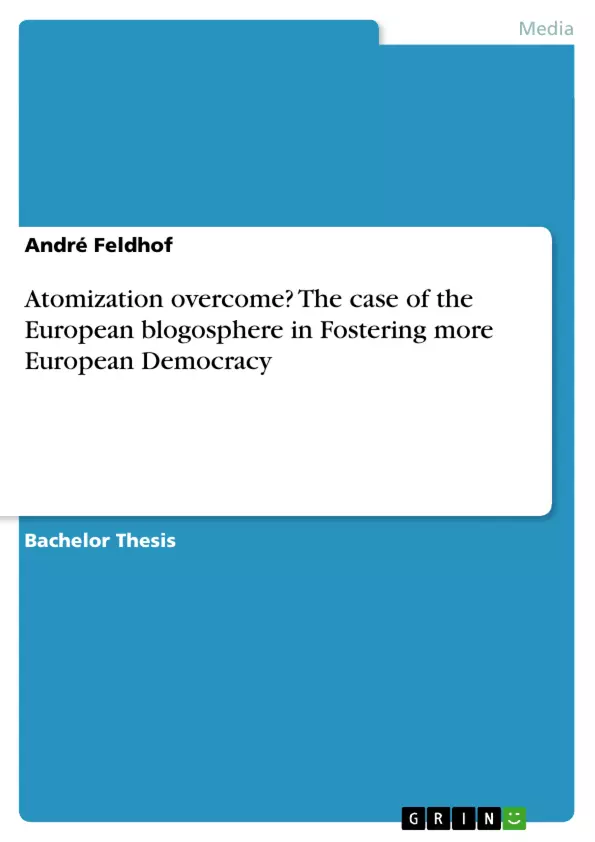Facebook, Twitter and Youtube have revolutionized global communication. The possibility to voice opinions online changes patterns of democracy and of democratic participation.
During the US election campaign of President Barack Obama, blogs and bloggers have been a powerful factor. Drawing upon insights from the United States, this paper sets out to discuss the role of blogs during the European elections 2009. It further outlines the potential for blogs to bring about a veritable European public sphere in the future.
Inhaltsverzeichnis (Table of Contents)
- I. Introduction
- II. Definition of key terms
- III. The public sphere in the European Union
- IV. The blogosphere in the United States
- V. Rules of electoral campaigning in the EU and the potential for the European blogosphere
- VI. Conclusion
Zielsetzung und Themenschwerpunkte (Objectives and Key Themes)
This paper aims to explore the role of the European blogosphere in promoting more European democracy. It examines the ways in which blogs can influence political participation and provide democratic control over policy-makers in the European Union. The paper argues that blogs can help to fill the information gap and contribute to the development of a more unified European public sphere.
- Political Participation
- Democratic Control of Decision-makers
- The European Public Sphere
- The Role of the Blogosphere
- Electoral Campaigning in the EU
Zusammenfassung der Kapitel (Chapter Summaries)
The first chapter introduces the concept of the virtual revolution and its impact on political participation. It highlights the rise of citizen journalism and the emergence of blogs as a new platform for political discourse. The second chapter defines the key concepts of political participation and democratic control. It discusses different models of democracy and the role of media in ensuring accountability. The third chapter explores the notion of the public sphere in the European Union, highlighting the challenges of creating a unified public sphere due to diverse national media traditions and languages. The fourth chapter examines the role of blogs in US politics, highlighting their influence on political discourse and electoral campaigns. This chapter serves as a point of comparison for the analysis of the European blogosphere.
Schlüsselwörter (Keywords)
This paper focuses on the themes of political participation, democratic control, the European public sphere, the blogosphere, and electoral campaigning in the European Union. It investigates the potential of the European blogosphere to contribute to a more informed and participatory European democracy.
Frequently Asked Questions
What is the role of the blogosphere in European democracy?
Blogs serve as a platform for political participation and citizen journalism, helping to bridge the information gap between EU policy-makers and citizens.
How did the 2009 European elections utilize blogs?
The paper discusses the potential of blogs during the 2009 elections to foster a unified European public sphere, drawing lessons from the US election campaign of Barack Obama.
What is the 'European Public Sphere'?
It is a conceptual space where European citizens can discuss EU-wide issues. Diverse languages and national media traditions currently make its formation challenging.
Can blogs provide democratic control over decision-makers?
Yes, by voicing opinions online and practicing citizen journalism, bloggers can hold policy-makers accountable and increase transparency in the EU.
How does the US blogosphere compare to the European one?
The US blogosphere is more integrated and influential in national campaigns, serving as a model for how digital communication can revolutionize political participation.
- Quote paper
- André Feldhof (Author), 2009, Atomization overcome? The case of the European blogosphere in Fostering more European Democracy, Munich, GRIN Verlag, https://www.grin.com/document/132656



